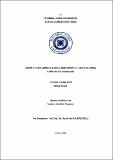DSpace Repository
LİDERLİK TARZLARININ ÇALIŞANLARIN ÖRGÜTSEL BAĞLILIKLARINA ETKİSİ VE BİR UYGULAMA
JavaScript is disabled for your browser. Some features of this site may not work without it.
| dc.contributor.author | Yeğin, Ahmet
|
|
| dc.date.accessioned | 2019-04-19T11:48:43Z | |
| dc.date.available | 2019-04-19T11:48:43Z | |
| dc.date.issued | 2018-01 | |
| dc.identifier.uri | http://hdl.handle.net/11547/1467 | |
| dc.description.abstract | Liderlik üzerine çok eski tarihlerden bu yana çok sayıda çalışma yapılmasına rağmen liderlik bugün bile gizemini korumaya devam etmektedir. Öyle ki günümüz işletmeleri de artan rekabet ve değişen çevre şartları karşısında liderliğin değerini anlamaya yönelik çalışmalar yapmaya başlamışlardır. Liderin ortaya koymuş olduğu tarz örgüt çalışanlarının davranışlarını direk etkilemektedir. Liderin sergilediği tarzdan etkilenen çalışan davranışları bu yönde şekillenir. Yapılan bu çalışmanın amacı kamu kuruluşlarından biri olan Sosyal Sigorta Kurumunda liderlik ve örgütsel bağlılık arasındaki ilişkiyi araştırmaktır. Bu çalışmada kurumdaki yöneticilerin benimsedikleri liderlik tarzlarının çalışan bağlılığına olan etkisini araştırmaktır. Çalışma üç bölümden oluşmaktadır. İlk bölümde; liderlik ve yönetici kavramları tanımlanmış sergiledikleri tarzlar üzerinde durulmuştur. İkinci bölümde; örgütsel bağlık kavramı tanımlanmış ve bu kavramın önemi üzerin de durulmuştur. Daha sonra ise örgütsel bağlılık türleri, örgütsel bağlılığa etki eden faktörler ve örgütsel bağlılığın sonuçlarına değinilmiştir. Üçüncü bölümünde ise; bu teorik bilgilerden faydalanılarak önemli kamu kuruluşlarından biri olan Sosyal Sigorta Kurumundaki iş görenlerin örgüte bağlılıklarında liderin sergilediği tarzın etkinliği olup olmadığı incelenmiştir. Bu iki kavram arsındaki ilişkiyi ölçmek için üç bölümlü bir anket formu düzenlenmiştir. Tüm Veriler SPSS 22. 0 paket programında analiz edildi. Sürekli verilerin gösterimi medyan (minimum-maksimum) ve (ortalama standart sapma) ile verildi. Verilerin normal dağılıma uyumu Shapiro Wilk Testi ile sınandı. Test sonucunda normal dağılım gösteren sürekli veriler için ortalamalar arası karşılaştırmalarda Independent T test ve ANOVA Testi kullanıldı. Normal dağılım göstermeyen sürekli veriler için ise Mann-Whitney U Test ve Kruskal Wallis Test kullanıldı. Sürekli değişkenler arasındaki ilişki Spearman Korelasyon katsayısı ile incelendi. | tr_TR |
| dc.language.iso | tr | tr_TR |
| dc.publisher | İSTANBUL AYDIN ÜNİVERSİTESİ SOSYAL BİLİMLER ENSTİTÜSÜ | tr_TR |
| dc.subject | Liderlik | tr_TR |
| dc.subject | Bağlılık | tr_TR |
| dc.subject | Örgütsel Bağlılık | tr_TR |
| dc.subject | Çalışanlar | tr_TR |
| dc.subject | Leadership | tr_TR |
| dc.subject | Commitment | tr_TR |
| dc.subject | Workers | tr_TR |
| dc.subject | Organizational commitment | tr_TR |
| dc.title | LİDERLİK TARZLARININ ÇALIŞANLARIN ÖRGÜTSEL BAĞLILIKLARINA ETKİSİ VE BİR UYGULAMA | tr_TR |
| dc.type | Thesis | tr_TR |
| dc.description.abstractol | Since ancient times, in spite of numerous studies on leadership, the leadership remains a mystery even today. Today's enterprises have begun to make efforts to understand the value of leadership in the face of increasingly competitive and changing environmental conditions. The style that the leader performed directly affects the behavior of its employees. The behaviors of the employee affected by the leader’s style are shaped in that way. The purpose of that study is to search the relationship between leadership and the organizational commitment in the Social Insurance Institution which is one of the public institutions. This study is researching the impact of the leadership style of the managers of the institution on the employee commitment. The study consists of three parts: In the first part, leadership and management concepts defined, and focused on the styles they performed. In the second part, the concept of organizational commitment is also defined and emphasized the importance of this concept. Then the types of organizational commitment, the factors that affect organizational commitment and the consequences of organizational commitment are discussed. In the third part, by utilizing this theoretical knowledge, it is examined whether the style that the leader performed has effectiveness on the organization commitment of those who work in the Social Insurance Institution. To measure the relationship between these two concepts, a two-part survey has been organized. All data have been analyzed in the SPSS 22.0 package program. Representation of continuous data has been given with median (Minimum-Maximum) and (average ± standard deviation). Adaptation to the normal distribution of the data has been tested with Shapiro Wilk Test. Independent T Test and Anova Test have been used for continuous data that show normal distribution in the test. Mann-Whitney U Test and Kruksal Wallis Test have been used for continuous data that don’t show normal distribution. The relationships between continuous variables have been analyzed with Spearman's Correlation Coefficient. | tr_TR |
Files in this item
This item appears in the following Collection(s)
-
Tezler -- Thesis [3470]
